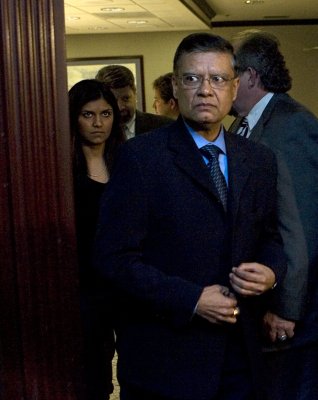
Dr. Dipak Desai, majority owner of the Endoscopy Center of Southern Nevada, leaves a hearing Monday at Las Vegas City Hall. A health scare connected to the center has caused a wave of lawyer ads.
Wednesday, March 5, 2008 | 2 a.m.
Nevada Personal injury lawyer Web sites
As if the airwaves weren’t already saturated with commercials for personal injury lawyers, last week’s revelation of a potential hepatitis outbreak immediately prompted many of them to bombard the public with bold advertisements whose blood-red message is: You may be at risk!
Alarmist? Maybe. But it’s clear the attorneys are satisfying a colossal and possibly unprecedented need in Nevada. The crisis is expected to spur one of the largest class action lawsuits in state history, potentially comparable to the one that followed the 1980 fire that killed 87 people at the former MGM Grand, now Bally’s.
In the latest case, “these people did nothing wrong and now they’ve been exposed to potentially lethal diseases,” said Las Vegas attorney Francis Churchill, who is promoting his firm as an option on craigslist.com. “At some point, the court will appoint a lead counsel ... and the attorneys will come together and work on it.”
Churchill acknowledges the potential payout is one of the motivations for him and other attorneys. That’s a factor, presumably, even for the lawyers who are choosing not to advertise.
But there’s also the same outrage among some attorneys as there is among the public about health officials’ announcement that the Endoscopy Center of Southern Nevada put at least 40,000 people at risk for hepatitis and HIV.
Many of those worried patients are, understandably, contacting lawyers, especially those who have advertised — on television, on news and sports radio, on the Web, in full-page and classified newspaper ads.
“How else do you get the word out? People are terrified about this,” said attorney Ed Bernstein, one of the local pioneers of lawyer advertising.
Within minutes of news breaking about the clinic, the Nevada Bar Association received multiple phone calls from local as well as out-of-state firms, said David Clark, the association’s general counsel. The firms were notifying the bar that they would be advertising.
Bernstein estimates his downtown office has received 500 calls a day since last Wednesday from concerned patients. On Monday his two receptionists were fielding call after call after call. They jotted down the names of the patients and promised someone would get back to them.
The current wave of TV ads highlighting the outbreak has been planted in the commercial breaks of local affiliates and on cable channels. Unless you’re watching a program on a digital recorder or on tape, the sometimes shrill commercials are unavoidable: They’re targeted for “SportsCenter” viewers and fans of “CSI”; commercials are squeezed between Dairy Queen and Cheerios ads and sandwiched between the segments of local newscasts.
The adage is that advertising works, after all.
“Everyone knows who Glen Lerner is,” Clark said of the ubiquitous personal injury attorney whose over-the-top ads made him famous as “the Heavy Hitter.”
A state Bar Association rule that went into effect in September modified regulations for attorney advertising, clarifying that the commercials can’t be false or misleading. A past rule had established taste standards, but Lerner successfully argued that violated the First Amendment.
The notion of attorney as market maven is a fairly recent phenomenon, circa 1970. Bombastic and often low-rent ads are common in most media markets nationwide and along freeways. One local personal injury attorney walks through a junkyard as he promotes his firm.
Some critics have likened attorneys who advertise to used-car salesmen.
“A lot of people see them as tasteless and unseemly,” said Robert Thompson, director of Syracuse University’s Bleier Center for Television and Popular Culture. “But when it’s time to get a car, they remember it.”
Many lawyers are reluctant to advertise.
Attorney Craig Kenny says he never had advertised his firm until word spread about the potential hepatitis outbreak. So he bought a full-page ad in Sunday’s newspaper because this crisis “was so outrageous.” That description — “outrageous” — screams across the top of his ad, softened by what follows: a six-paragraph summary of the matter, the history and the health implications.
Kenny opted against buying TV time.
“I don’t want to be perceived as a TV lawyer,” he said. “I think you lose your credibility sometimes if you go on TV.”
Some critics say commercials for practitioners of a profession once viewed by most as dignified remain jarring even in an era of ads promising cures for sexual troubles — ads often broadcast during sporting events.
Thompson suspects people seeking an attorney fall into one of two camps: those who are encouraged that there’s someone seemingly aggressive, maybe even ruthless, who could help them; and more “snobby” types who find such advertisements unbecoming for lawyers.
It has been two decades since Bernstein has heard regular complaints about his and other attorneys’ advertisements, perhaps indicating a general acceptance of the practice — or maybe resignation that they’re here for good.

Join the Discussion:
Check this out for a full explanation of our conversion to the LiveFyre commenting system and instructions on how to sign up for an account.
Full comments policy